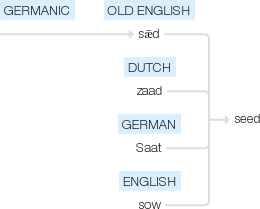Seed
Old English sǣd, of Germanic origin; related to Dutch zaad, German Saat, also to the verb sow1.
wiktionary
From Middle English seed, sede, side, from Old English sēd, sǣd(“seed, that which is sown”), from Proto-West Germanic *sād, from Proto-Germanic *sēdiz(“seed”), from Proto-Indo-European *seh₁tis (corresponding to Proto-Germanic *sēaną(“to sow”) + *-þiz), from *seh₁-(“to sow, throw”). Cognate with West Frisian sied(“seed”), Dutch zaad(“seed”), Low German Saad(“seed”), German Saat(“sowing; seed”), Icelandic sæði(“seed”), Danish sæd(“seed”), Swedish säd(“seed”), Latin satio(“seeding, time of sowing, season”). More at sow.
see + -d(“past tense suffix; variant of -ed”).
etymonline
seed (n.)
Old English sed, sæd "that which may be sown; an individual grain of seed; offspring, posterity," from Proto-Germanic *sediz "seed" (source also of Old Norse sað, Old Saxon sad, Old Frisian sed, Middle Dutch saet, Old High German sat, German Saat), from PIE *se-ti- "sowing," from root *sē- "to sow." Figurative use in Old English. Meaning "offspring, progeny" rare now except in biblical use. Meaning "semen" is from c. 1300. For sporting sense, see seed (v.).
seed (v.)
late 14c., "to flower, flourish; produce seed;" mid-15c., "to sow with seed," from seed (n.). Meaning "remove the seeds from" is from 1904. Sporting (originally tennis) sense (1898) is from notion of spreading certain players' names so as to ensure they will not meet early in a tournament. The noun in this sense is attested from 1924. Related: Seeded; seeding.
